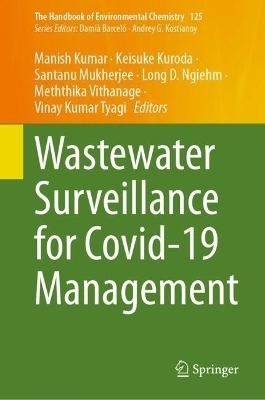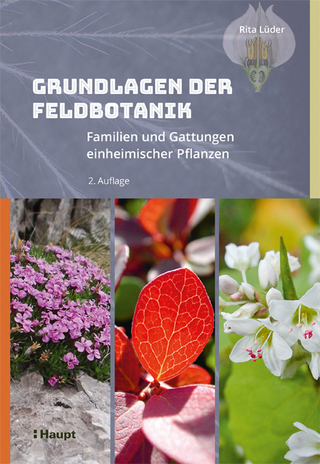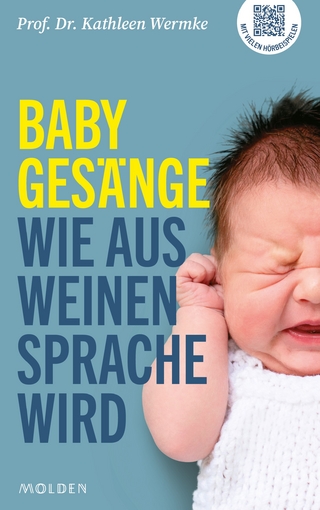
Wastewater Surveillance for Covid-19 Management
Springer International Publishing (Verlag)
978-3-031-53905-3 (ISBN)
This book reviews the recent challenges and future perspectives involved in the wastewater-based epidemiology (WBE) for COVID-19. The book aims to improve the monitoring of COVID-19 in wastewater by focusing on recent scientific studies in the surveillance and treatment of wastewater containing SARS-CoV-RNA, assessment of COVID-19 in the community and delivering a new scientific understanding of prevalence and re-emergence based on the WBE. It also provides a global perspective on effective detection methods for the analysis and interpretation of the RNA count of SARS-CoV-2 virus in wastewater and predicts the effects wastewater may have on the infection rate.
Readers will find in this book case studies from France, India and Southeast Asian of non-invasive population-based monitoring of SARS-CoV-2 through sewage surveillance, and will learn more about the virus behaviour and transmission in different environmental settings. The significance of membrane technologies for virusremoval from water is also addressed in this book, as well as advanced techniques for identifying, quantifying, and characterizing SARS-CoV-2 in activated sludge and wastewater.
The book provides a great interface to researchers such as microbiologists, environmental engineers, data scientists and civil engineers, emphasizing issues related to the current monitoring methodology. Furthermore, it also encourages researchers and policymakers by raising awareness of potential new methodologies for wastewater surveillance and accurate monitoring of COVID-19.
Dr. Manish Kumar is a Fellow of the Royal Society of Chemistry (FRSC) and faculty at the discipline of Earth Sciences at the Indian Institute of Technology Gandhinagar, Gujarat, India. He earned his Ph.D. in Environmental Engineering from the University of Tokyo, Japan. He has been the recipient of Water Advanced Research and Innovation (WARI) Fellowship, Japan Society for the Promotion of Science (JSPS) foreign research fellowship, Brain Korea (BK)-21 post-doctoral fellowship, Monbukagakusho scholarship, Linnaeus-Palme stipend from SIDA, Sweden, and Research Fellowship from CSIR, India, and others. He published 80+ international peer-reviewed journal papers, 120+ other scholarly works, and has 17 years' research/teaching experience. He is the core committee member of the International Water Association (IWA)-India Chapter and one of the editorial board members of the STOTEN and other Scopus-indexed journals. He is one of the illustrious members of the global collaboration on the wastewater-based epidemiology of COVID-19.
Dr. Keisuke Kuroda is an Associate Professor at the Department of Environmental and Civil Engineering, Toyama Prefectural University, Japan. He received his Ph.D. in Engineering from the University of Tokyo (2010). He was a postdoctoral research fellow at Eawag, Switzerland, and the University of Tokyo, and was a senior scientist at National Institute for Environmental Studies (NIES), Japan. His research interests lie in the dynamics of various natural and man-made pollutants in the water environments and their management in urban water systems. Particular interests are subsurface geochemistry and mitigation technologies of contaminants of emerging concern (CECs), such as pharmaceuticals and personal care products (PPCPs), arsenic, and per- and polyfluorinated substances (PFAS). Recent research focuses include assessment of environmental fate of antiviral drugs and their ecotoxicological risks, wastewater-based epidemiology, advanced oxidation process (AOP), and photocatalytic water treatment for decentralized water systems. He is serving as one of the editorial board members in Science of the Total Environment (STOTEN) and was a guest editor of STOTEN, Journal of Environmental Management (JEMA) and the Scientific World Journal.
Dr. Santanu Mukherjee is an Assistant Professor at the School of Agricultural Sciences, Shoolini University of Biotechnology and Management Sciences, Himachal Pradesh, India. He obtained his Ph.D. degree from the University of Bonn, Germany, and worked as a guest scientist in FZJ, Juelich, Germany. He was a visiting researcher at Savannah River Ecological Laboratory, USA. After returning to India, he worked as a DST-SERB (Department of Science and Technology, Ministry of Science and Technology in India) postdoctoral fellow at one of the top institutions of this country, IIT-Gandhinagar. He is the recipient of multiple accolades of national and international repute, to name a few: the India-Japan Hiyoshi Young Leaf Award, the Early Career Travel Grant by The Geochemical Society (GS) and the European Association of Geochemistry (EAG), the ICAR International Fellowship, the Hutchison Young Scientists Foundation Awards, the DST-SERB-GOI Fellowships, the DST-SERB TARE grant, the DST-SERB Start-up grant, the UCSI-REIG grant (2023) with Malaysia, the GRIFA (Italian Pesticide Agency) grant, and the EU-COST action biochar grant. His research interest includes the fate of emerging contaminants, biogeochemical transformation of nutrients, and the role of dissolved and particulate organic matter in deciding contaminants' fate in the environment. He is serving as a youth editorial board member of Biochar (Scopus indexed journal from Springer), guest editor of Sustainability journal, reviewer of many Scopus-indexed journals, have also edited three books, and published several peer-reviewed papers and book chapt
Chapter 1 Surveillance of SARS-CoV-2 in Wastewater at the Population Level: Insights into the Implementation of Non-invasive Targeted Monitoring in Singapore and the USA.- Chapter 2 Geospatial Mapping of COVID-19 Cases in Kerala Using Clinical Data: A Case Study from South India for Policy Advocacy.- Chapter 3 Virus Separation by Membrane Technology.- Chapter 4 Toward Reliable Detection and Quantification of SARS-CoV-2 in Wastewater and Environmental Water.- Chapter 5 Broadening Wastewater Monitoring of SARS-CoV-2 RNA.- Chapter 6 WBE: An Integral Part of Mass Surveillance of COVID-19?.- Chapter 7 Implementation of a National Wastewater Surveillance System in France as a Tool to Support Public Authorities During the Covid Crisis: The Obepine Project.- Chapter 8 Covid-19: Survival and Transmission in Wastewater and Sludge.- Chapter 9 COVID-19: An Insight into Social Dimension.- Chapter 10 Double Trouble: COVID-19 and Microplastics.- Chapter 11 Impact of COVID-19-Induced Lockdown on Air Quality of Major Cities of Uttar Pradesh, India.- Chapter 12 Comprehensive Review of COVID-19: Impacts, Comorbidity, and Management.- Chapter 13 Prediction in the Context of Viral Pandemics: A Special Emphasis on SARS-CoV-2.- Chapter 14 Environmental Monitoring for Pandemic Restriction and Proper Regulation in the Post-COVID Era.- Chapter 15 Antimicrobial Resistance Ignited by COVID-19 Pandemic: SOS for Antimicrobial Stewardship.- Chapter 16 Crucial Effects of COVID-19 on Antimicrobial Resistance.- Chapter 17 COVID-19 Management in the Northeastern India.
| Erscheinungsdatum | 07.04.2024 |
|---|---|
| Reihe/Serie | The Handbook of Environmental Chemistry |
| Zusatzinfo | XIV, 374 p. 60 illus., 30 illus. in color. |
| Verlagsort | Cham |
| Sprache | englisch |
| Maße | 155 x 235 mm |
| Themenwelt | Sachbuch/Ratgeber ► Natur / Technik ► Natur / Ökologie |
| Naturwissenschaften ► Biologie ► Ökologie / Naturschutz | |
| Naturwissenschaften ► Chemie ► Technische Chemie | |
| Technik ► Umwelttechnik / Biotechnologie | |
| Schlagworte | Bioaerosols • Covid-19 • Detection methods • SARS-CoV-2 • Surveillance sampling system • Wastewater based epidemiology |
| ISBN-10 | 3-031-53905-2 / 3031539052 |
| ISBN-13 | 978-3-031-53905-3 / 9783031539053 |
| Zustand | Neuware |
| Informationen gemäß Produktsicherheitsverordnung (GPSR) | |
| Haben Sie eine Frage zum Produkt? |
aus dem Bereich


